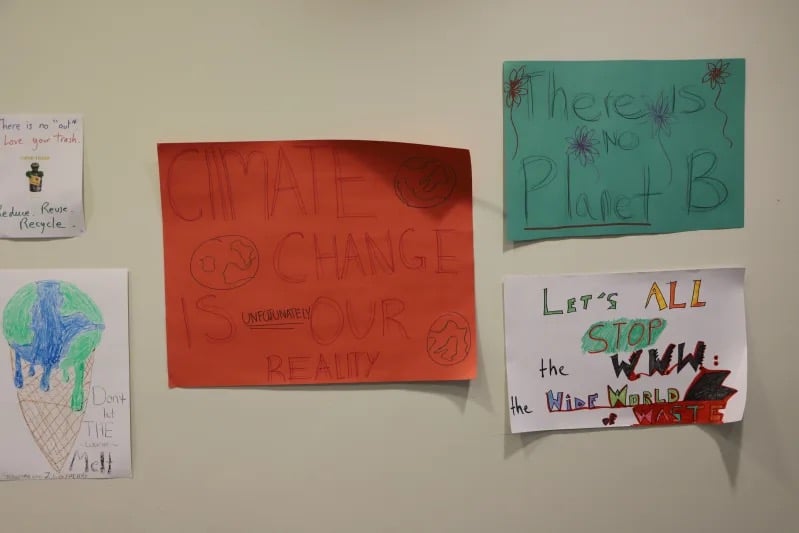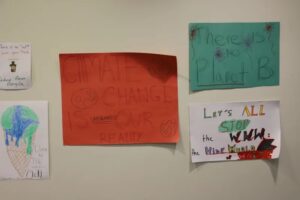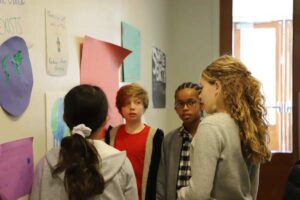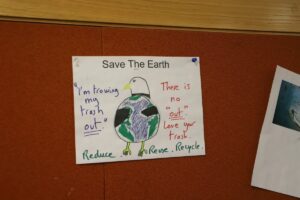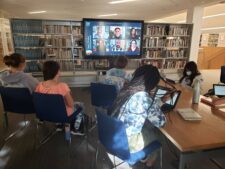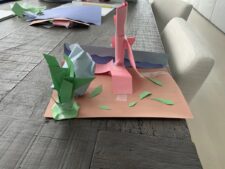The cafeteria is abuzz with chatter as students exchange jokes over General Tso’s chicken and orange juice. But for the leaders of the Fieldston Middle School Environmental Club, who are holding a lunch meeting for Fieldston Middle’s first-ever Earth Day Forum on April 17, the tone is much more serious.
“People don’t know right now what climate change is,” says Natasha K. ’26. “It’s such a huge issue that’s been kind of pushed aside for years, and everyone always thought, ‘Oh, we’ll do it in the future when we have better technology.’ But at some point, you can’t keep pushing it into the future because it’s not slowing down for us.”
Alex B. ’26, Genevieve P. ’24, and Leo C. ’26 — the other leaders of the Environmental Club — agree. “Climate change is a big topic, and it’s very real,” says Leo. “Our President doesn’t do much about it, so we need to rely on ourselves.”
“At this point,” says Natasha, “if it’s not a global effort, it’s not going to succeed.”
The Fieldston Middle Environmental Club is building on the groundwork that was laid last year, when it was founded. Fieldston Middle French Teacher Angèle Renard, who advises the club, explains that the inaugural year was important for raising awareness about environmental issues at the Ethical Culture Fieldston School.
“What was really nice about that year,” she says, “was to see the motivation of the students who are in the club, the knowledge that they had about different environmental issues, and how they had adults around them who are involved in environmental actions. They were not only worried but also thinking about how to move things forward.”
At this point, if it’s not a global effort, it’s not going to succeed.
Most of last year’s club members graduated from Fieldston Middle in June, so this year has seen fresh leadership rise to the challenge. For Alex, Leo, and Natasha, however, their involvement in the Environmental Club is just a continuation of work they were already doing as 5th Graders at Fieldston Lower.
“At the beginning of the year, the 5th Grade was learning about plastic waste and its impact on the environment,” says Joe McCauley, Principal of Fieldston Lower School. “Soon after, some students noticed that our daily snack deliveries were being brought up to the classrooms in plastic bags, so they sprang to action.” Leo and a classmate started a petition at Fieldston Lower School, asking the school to consider reusable bags for snack delivery. Within days, almost every student had signed on.
Older students at Fieldston Middle are able to bring in their resources and knowledge of the school as well. Genevieve is working across co-curricular groups to introduce the topic of environmentalism to the Fieldston Middle literary magazine. “Over the summer, I thought of a theme pertaining to nature that we could have for the literary magazine and have different artworks and essays written about nature and people’s experiences in nature,” she says. The magazine will also include a piece written by the Environmental Club.
In addition, Genevieve has an eye on rejuvenating existing spaces at Fieldston Middle — she’s bringing in a butterfly expert who will establish a butterfly habitat on the Green Roof in May and return in the fall to check on the state of the insects and the plants on which they feed and reproduce.
As part of its yearlong work, the Environmental Club is enlisting the help of partners across the school to build a collective movement. The club’s leaders have reached out to Gus Ornstein in the Athletics Department to discuss alternatives to the plastic drinking cups the department uses during games and worked with Ingrid Sabogal and Jeannie Crowley in the Technology Department to raise awareness of the environmental costs of running projectors overnight.
The club’s activism is also having an effect on other students. In December, Alex, Genevieve, Leo, and Natasha presented to Fieldston Middle to announce the Earth Day Forum and to encourage their peers and teachers to participate in workshops. Jeein C. ’26, was inspired to take action. “After the assembly, I actually realized that climate change is a big thing,” she says. “I wanted to join and do something about it, and all my friends encouraged me to do something about it, too.”
The Earth Day Forum on April 17 will have workshops organized in three categories: informational workshops that introduce current environmental issues, interactive workshops that help students understand and address these issues, and activism-oriented workshops that empower students to participate in ongoing efforts. In conjunction with other school-sponsored events, including a recent visit by a United Nations official who spoke about the effects of climate change on population displacement, these workshops will aim to make the ECFS community more environmentally aware. One workshop that has already been confirmed centers on the positive impact a plant-based diet has on the environment. Fieldston Middle French Teacher Vincent Lebrun, who submitted the workshop proposal, explains, “Many people don’t know that if you’re vegetarian, you have a very positive impact on the environment.” While Lebrun is aware that some may hesitate to adopt a plant-based diet, he hopes that, as awareness grows, people will consider smaller but still-meaningful measures they can take to reduce animal consumption. In that spirit, the school’s food-service provider, AVI, now offers meatless options on “mindful Mondays.”
As they ramp up for their big event in April, the student leaders of the Environmental Club are still looking for more volunteers in the community — including parents, alumni, faculty and staff, and students — to host workshops. Their goal is to make their programming as varied as possible to engage a broad swath of student interests.
It’s fair to say, though, that the students have already done a lot, not only to make this event a success, but also to educate the ECFS community on the dangerous threat of climate change and why we must take action now.
“We live in a country where the people in charge aren’t making the best decisions, and people with the money and the power in our world in general aren’t doing the things they should with their resources,” says Alex. “If they’re not going to do it, we’re going to do it instead.”
